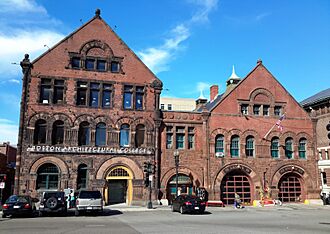941–955 Boylston Street facts for kids
Quick facts for kids 941–955 Boylston Street |
|
|---|---|
 |
|
| General information | |
| Architectural style | Richardsonian Romanesque |
| Town or city | Boston, Massachusetts |
| Country | United States |
| Coordinates | 42°20′53″N 71°05′08″W / 42.34806°N 71.08566°W |
| Completed | 1887 |
| Client | City of Boston |
| Design and construction | |
| Architect | Arthur H. Vinal |
The building at 941–955 Boylston Street in the Back Bay area of Boston, Massachusetts is a very special place. It was designed in 1886 by Arthur H. Vinal, who was the city's main architect at the time. This building was the first in Boston to combine a fire station and a police station into one! It was finished in 1887.
Contents
A Special Building in Boston
This historic building is built in a style called Richardsonian Romanesque. This style uses strong, heavy stone and round arches, making buildings look very grand and solid. Arthur H. Vinal also designed another famous building in this style, the Chestnut Hill Water Works pumping station, around the same time. The city of Boston has officially named this building a Boston Landmark, which means it's an important part of the city's history and look.
Home to Firefighters and More
The fire station part of the building, at 941 Boylston Street, is still very busy today. It is home to Boston Fire Department Engine Company 33 and Ladder Company 15. These brave firefighters help keep Boston safe every day.
From Police to Art and Learning
The other part of the building, at 955 Boylston Street, used to be a police station. It was home to Boston Police Department Division 16 until 1976. Back then, there was even a courtyard between the two buildings that led to stables for the horses used by both the fire and police departments!
When police started using cars instead of horses, many smaller police stations like this one were combined into bigger districts. So, the police station closed in 1976. After that, from 1976 to 2007, the building became home to the Institute of Contemporary Art. This was a place where people could see modern art. In 2007, the Boston Architectural College bought the building. Today, it helps students learn about designing buildings and spaces.
Remembering Heroes
On the front of the building, facing Boylston Street, there are special plaques. These plaques honor four Boston firefighters who bravely gave their lives while on duty. They remember Cornelius J. Noonan (who passed away in 1938), Richard F. Concannon (1961), Richard B. Magee (1972), and Stephen F. Minehan (1994). These plaques help everyone remember their courage and sacrifice.
 | Charles R. Drew |
 | Benjamin Banneker |
 | Jane C. Wright |
 | Roger Arliner Young |

